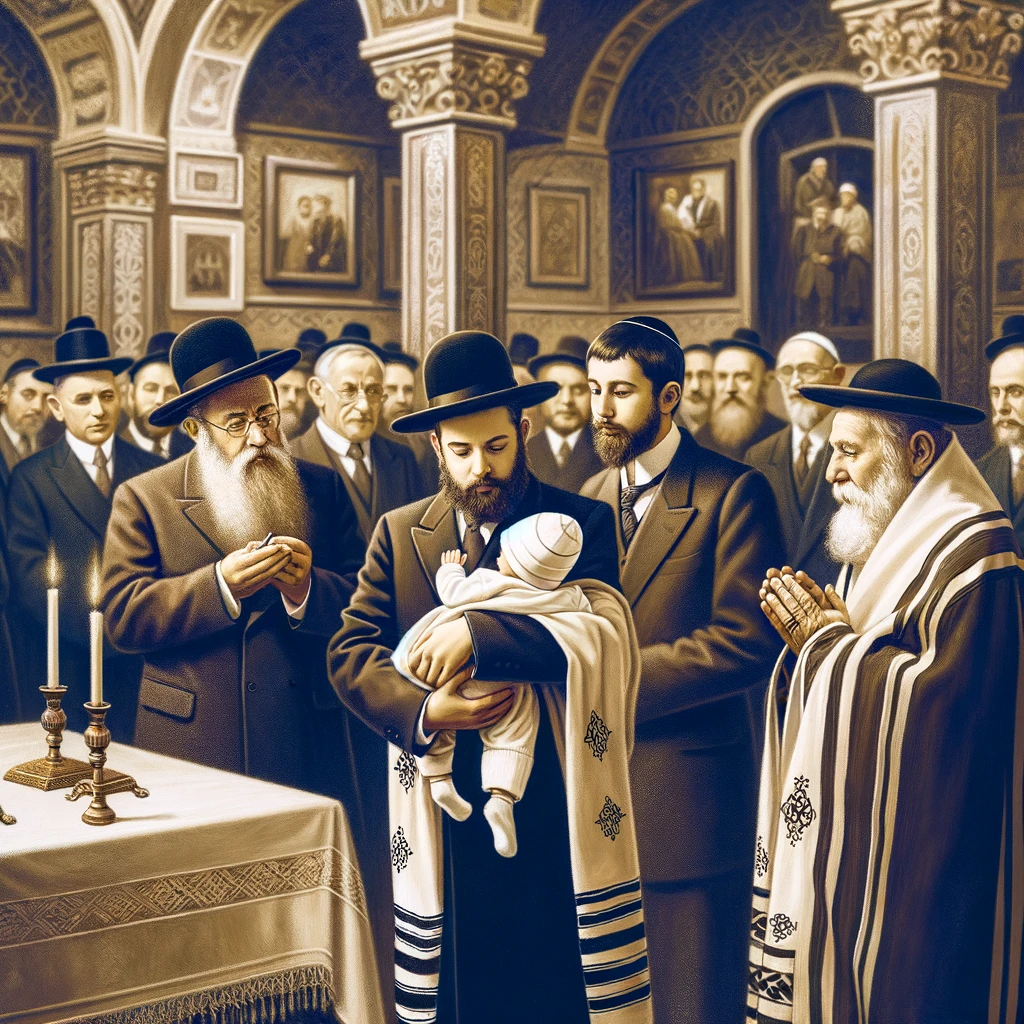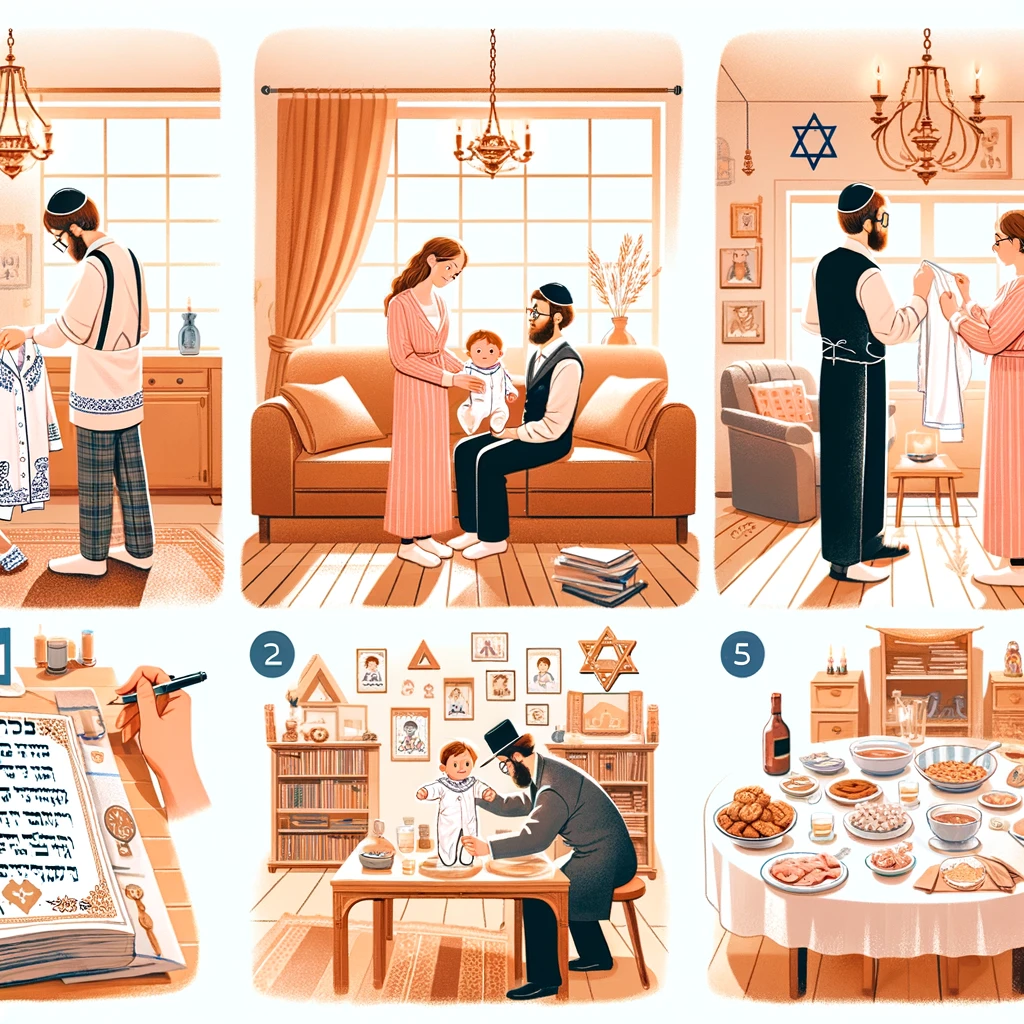Health and Safety in Circumcision: The Mohel's Approach to Hygiene and Care
Qualified sap

 297
297 
Mohel in the Modern Era: Professionalism, Safety, and Responsibility
Circumcision, one of the ancient and significant rituals in Judaism, is undergoing changes and adaptations in the era of modern medicine. While the essence and tradition remain steadfast, the emphasis on safety, sterility, and risk reduction is reshaping the role of the mohel. This article will examine how mohels incorporate advanced medical practices while strictly adhering to halacha and custom.
Mohel as a Medical Professional - At the forefront of the modern mohel's priorities is the meticulous adherence to hygiene and maximum sterility. Mohels undergo extensive training in sterilization and disinfection procedures and use only sterile and disposable equipment. Dedicated knives are replaced after each use, and all working surfaces are subject to thorough disinfection. The mohel himself wears gloves, a mask, and a sterile gown to prevent infections. Thanks to these stringent protocols, the risk of complications remains extremely low.
As Rabbi Yosef Cohen, an experienced and expert mohel explains: "In the past, mohels had to rely on their experience and intuition to prevent infections. Today, with the knowledge and tools at our disposal, we can ensure a significantly high level of safety. This is a heavy responsibility, but also a great privilege."
Mohel as a Halachic Medical Authority - Minimizing Suffering and Discomfort Beyond the technical skills required to perform the circumcision itself, many mohels place emphasis on minimizing the suffering and pain of the infant. Advanced methods such as the use of local anesthetic ointment or administering sugar orally have become common practices aimed at reducing discomfort and helping to calm the baby. Mohels also receive training in the correct wrapping and holding of the infant to minimize distress and crying.
Rabbi Shmuel Levin, a young mohel and entrepreneur in the field, emphasizes: "The mitzvah and good intention are important beyond measure, but the manner of execution also has halachic and moral significance. The more we can reduce the suffering of the infant while adhering to all aspects of halacha, the more we fulfill our professional and spiritual obligation."
Mohel as a Supporter and Advisor for the Family - Guidance Before and After the Circumcision The role of the mohel does not end with the completion of the ceremony itself. Many mohels see themselves as guides and advisors for the family throughout the entire process. In pre-circumcision meetings, they explain the course of the ritual, answer questions, and alleviate concerns. After the circumcision, they provide detailed instructions for caring for the infant, including recommendations for changing dressings, bathing, and monitoring recovery. The availability and close guidance provide the family with a sense of security and professional and emotional support alike.
As stated by Rabbi Rachel Deutsch, an educator and parent advisor: "The mohel becomes a significant figure for the family during this sensitive and challenging period. The more comfortable the parents feel in reaching out to him for any matter, and receiving a responsive and attentive answer, the more empowering and calming the circumcision experience will be for them."
Mohel as an Educator and Advocate - Transmitting Traditional Values and Mitzvah The modern mohel is not just a technician or medical professional. He serves as an educator and advocate, whose role is to instill the values of tradition and the importance of the mitzvah in the younger generation. In the ceremony itself and in preliminary discussions, the mohel incorporates explanations of the sources of the custom and its significance, with the intention of strengthening the participants' connection and bond to Jewish heritage. In an era of detachment from religion and complex identity questions, this role has become more significant than ever.
Rabbi Chaim Shapiro, head of the Mohel Training Institute, concludes: "Being a mohel today is a multi-dimensional mission. We must be halachic authorities, physicians, advisors, and educators simultaneously. But it is precisely this complexity that makes the role so significant. In every circumcision, we not only introduce another soul into the covenant of our forefather Abraham but also shape a future of tradition, values, and responsibility."
Questions and Answers:
Is there regulation or oversight regarding the professionalism of mohels in Israel?
In Israel, the Ministry of Health supervises and regulates the training and certification of mohels. There is an official training program that includes studies in halacha, anatomy, surgical procedures, and sterilization. Mohels are required to pass certification exams and renew their permits every few years. However, it is important to verify each mohel's specific qualifications and check recommendations from the community.
Does the mohel recommend any tests or additional procedures prior to the circumcision?
Many mohels recommend conducting a blood test for bilirubin levels in the infant prior to the circumcision. This test is important for identifying conditions of extreme jaundice that may necessitate delaying the circumcision. In special cases, such as family backgrounds of bleeding disorders, the mohel may refer for further medical investigation. It is essential to have an open discussion with the mohel and consult with the pediatrician regarding each individual case.
Is the gender of the infant considered a relevant factor in circumcision?
From a halachic perspective, circumcision is performed only on male infants. However, some families choose to mark the birth of a girl with a special ceremony, "Simchat Bat" or "Zevad Bat," which includes a naming ceremony, blessings, and sometimes specific customs for the community. These ceremonies are not considered obligations but express the joy and celebration surrounding the birth of a daughter and serve as a spiritual and values-based counterpart to the son's circumcision.
Thus, the contemporary mohel is an exemplary figure, incorporating halachic proficiency, medical excellence, and human sensitivity at the forefront of Jewish practice. Through the knowledge, experience, and dedication he brings to each circumcision, he enables future generations to enter into the covenant of our forefather Abraham securely, calmly, and with a connection to tradition and values. In this way, the mohel is more than just a technical expert - he is a spiritual leader and partner in shaping the future of the Jewish people, covenant by covenant, generation by generation.
Summary - Mohel as a Representative of the Combination of Past, Present, and Future The modern mohel embodies the fascinating meeting between the world of halacha and the world of medicine, between eternal commandments and present-day challenges. Through the unique combination of professionalism, dedication, and values - he assures the continuity and relevance of circumcision in every generation. For many families, his figure serves as a source of inspiration and guidance in the first steps along the path of Judaism. With an understanding of changing needs and continuous adaptation, the mohel maintains the fire and essence of the ancient commandment, transmitting it forward in safety and love.






